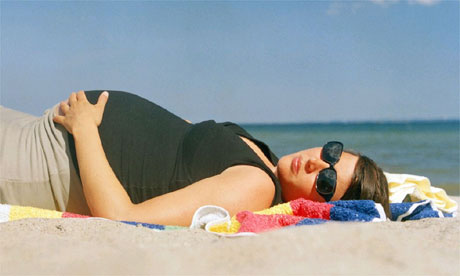
Playground myths — such as you cannot get pregnant standing up or you can reuse a condom if you wash it carefully — form the foundation of teenagers' knowledge about sex, according to a report published today.
A poll of 500 children aged 11 to 14 revealed the most common misconceptions about sex and relationships that dominate playground chat.
The most popular myths include you cannot get pregnant the first time you have sex, it is unhealthy for a boy with an erection not to have sex and you will lose your virginity if you use tampons.
The survey was commissioned by the Department for Children, Schools and Families as part of its teenage pregnancy strategy and its continuing campaign to reduce conception rates.
Some 44% of the teenagers questioned said they did not trust the sex advice they received from their friends and 75% wished they could talk more easily with their parents about sex and growing up, the report - Everyday Conversations, Every Day (pdf) - reveals.
Parents are reluctant to talk about sex because they are embarrassed or afraid that discussion will lead children to experiment and become promiscuous, the report says.
However young people are more likely to defer starting a sexual relationship, and to use contraception when they do become active, if their parents are confident in sexual discussions, it says.
Commenting on the report, Gill Frances, spokeswoman for the Teenage Pregnancy Independent Advisory Group, said: " Our campaign is about supporting parents and overcoming the fear of 'the big conversation' with their children.
"We are learning from parents and teens that having a series of less pressurised conversations throughout the teen years forges better relationships for the long term. Everyday conversations, every day will help keep the communication channel open."
The UK still has one of the highest teenage pregnancy rates in Europe although conception rates are falling.
According to the latest figures from the Office of National Statistics, the number of young women under the age of 18 in England who fell pregnant in 2006 was 2% lower than in the previous year and pregnancy rates were 1% lower for under-16s.
The ONS figures showed an under-18 conception rate of 40.6 for each 1000 girls aged between 15–17 in 2006, a drop of 12.9% since 1998. The 2006 conception rate for girls aged between 13 to 15 was 7.7 per 1000 - a fall of 12.6% since 1998.
The DCSF spokeswoman said: "This was the biggest drop for five years in conception rates and now puts un at the lowest level for 20 years."
The DCSF report and the continuing campaign to reduce pregnancy rates in young women comes as the government is reviewing sex and relationship education in schools following concerns expressed by the UK Youth Parliament.
An independent review group made up of young people, parents, sex education experts and teachers and chaired by the schools minister, Jim Knight, is due to publish its findings in the next few weeks, the DCSF confirmed.
A DCSF spokeswoman said: "The review includes representatives from all interested groups, so we will need to look at the recommendations before making a decision."

